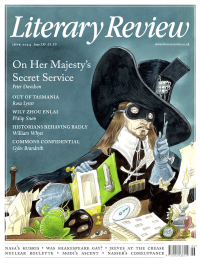Adrian Tinniswood
Upstairs, Downstairs, Gift Shop
The British Country House Revival
By Ben Cowell
The Boydell Press 250pp £75
Those of us who take an interest in such things have grown accustomed to reading about the death of the privately owned country house. Since 1974, when the V&A mourned its destruction in a landmark exhibition and the architectural historian John Cornforth predicted that ‘there is the distinct possibility of destruction on a scale not seen in this country since the sixteenth and seventeenth centuries’, we have been prepared for the worst. Notorious sales like those at Mentmore in 1977 and at Pitchford Hall in 1992 seemed to confirm that there was no hope for the private stately home. We thanked God for the National Trust, revisited Brideshead on the television and, in an excess of elegiac zeal, wandered through long galleries and dusty halls before they and their owners faded into the past, pursued by the taxman.
So it is refreshing to read, in Ben Cowell’s enjoyable review of the past fifty years of the stately home business, that ‘far from being on the verge of extinction, country houses in Britain are in a better state today than they have been for nearly a century’. They are thriving, he argues, because their owners have been smart enough not only to open them to the public (they had to do that anyway to qualify for government grants) but also to explore every option available to a historical country house, from operating as a wedding venue – made possible by the 1994 Marriage Act, which allowed civil weddings to take place outside register offices – to providing locations for filming, open-air concerts, farm shops and industrial units. When Covid-19 was at its worst, the enterprising owners of Knebworth House even set up a drive-in cinema in the grounds.
Cowell is well placed to review the state of the stately home. In his day job he is director general of Historic Houses (called until recently the Historic Houses Association), which since its foundation in 1973 has represented the interests of the private owners of Britain’s mansions and manor houses.

Sign Up to our newsletter
Receive free articles, highlights from the archive, news, details of prizes, and much more.@Lit_Review
Follow Literary Review on Twitter
Twitter Feed
Margaret Atwood has become a cultural weathervane, blamed for predicting dystopia and celebrated for resisting it. Yet her ‘memoir of sorts’ reveals a more complicated, playful figure.
@sophieolive introduces us to a young Peggy.
Sophie Oliver - Ms Fixit’s Characteristics
Sophie Oliver: Ms Fixit’s Characteristics - Book of Lives: A Memoir of Sorts by Margaret Atwood
literaryreview.co.uk
For a writer so ubiquitous, George Orwell remains curiously elusive. His voice is lost, his image scarce; all that survives is the prose, and the interpretations built upon it.
@Dorianlynskey wonders what is to be done.
Dorian Lynskey - Doublethink & Doubt
Dorian Lynskey: Doublethink & Doubt - Orwell: 2+2=5 by Raoul Peck (dir); George Orwell: Life and Legacy by Robert Colls
literaryreview.co.uk
The court of Henry VIII is easy to envision thanks to Hans Holbein the Younger’s portraits: the bearded king, Anne of Cleves in red and gold, Thomas Cromwell demure in black.
Peter Marshall paints a picture of the artist himself.
Peter Marshall - Varnish & Virtue
Peter Marshall: Varnish & Virtue - Holbein: Renaissance Master by Elizabeth Goldring
literaryreview.co.uk